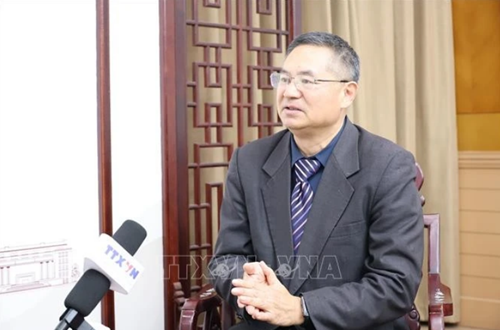In an interview with the Vietnam News Agency, the Chinese scholar highlighted the historical significance of Vietnam’s liberation of the South and national reunification (April 30) as well as the tremendous achievements obtained by the Vietnamese people over the past five decades. Professor Cheng said that this historic event marked the end of decades-long war in Vietnam, establishing a crucial foundation for national reunification and progression towards socialism. Besides, it ensured Vietnam’s independence, sovereignty, and territorial integrity while bringing lasting peace and stability to the nation.
    |
 |
|
Prof., Dr. Cheng Hanping, Director of the Vietnam Research Center at Zhejiang University of Technology |
The victory made contributions to building the Party’s prestige among the people and advancing the country to socialism, forming a new society where citizens take ownership and safeguard revolutionary achievements, he said.
Regarding its international significance, Cheng noted that this triumph inspired the spirit and confidence of semi-colonial and not-yet-independent nations while enriching the anti-imperialism and anti-colonialism struggle experience for people in the "third world" (poor or developing countries). Vietnam's successful resistance wars against French colonialism and U.S. imperialism have left a profound mark in the history of the national liberation movement across the globe. The victory proved that Vietnam found a development path suitable to its conditions, becoming a model for many countries.
He also observed that Vietnam currently holds a prominent position and influence in the international politics arena, demonstrating successful political and economic transformation over the past 50 years and reflect the enduring vitality of the Doi moi (renewal) policy. Accordingly, from one of the least developed countries, Vietnam has become a country with a strong economy and improved people’s living conditions.
The country aims to become a high-income, developed country by 2045, proving that the economic policies introduced by the Communist Party of Vietnam following the Doi moi period are reasonable, practical, and effective. Besides, the “bamboo” diplomacy, based on President Ho Chi Minh's diplomatic philosophy, has helped Vietnam maintain its national identity amidst competition between major powers, expand international relations, and maximize national interests.
Moreover, Vietnam consistently stands on the side of international justice and fairness, supporting the democratization of international relations, defending the U.N.’s role, and promoting multilateralism and globalization. Domestically, the society remains stable with good order while the investment environment has improved, attracting foreign capital - all demonstrating the excellent leadership capacity of the Party.
Cheng stressed that the success also represents a combination of military struggle and flexible diplomacy, reflecting the peace-loving spirit of the Vietnamese people.
Source: VNA